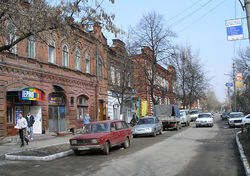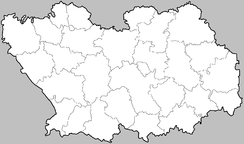Penza
| Penza (English) Пенза (Russian) |
|
|---|---|
| — Inhabited locality — | |
 Historical Street in Penza |
|
.svg.png) Location of Penza Oblast in Russia |
|
 Penza
|
|
| Coordinates: | |
_(2001).png) |
.png) |
| Administrative status | |
| Country | Russia |
| Federal subject | Penza Oblast |
| Administrative center of | Penza Oblast |
| Municipal status | |
| Urban okrug | Penza Urban Okrug |
| Mayor | Roman Chernov |
| Representative body | City Duma |
| Statistics | |
| Area | 288.5 km2 (111.4 sq mi) |
| Population (2002 Census) | 509,900 inhabitants[1] |
| - Rank | 29 |
| - Density | 1,767 /km2 (4,580 /sq mi)[2] |
| Time zone | MSK/MSD (UTC+3/+4) |
| Founded | 1663 |
| Postal code(s) | 56 401 |
| Dialing code(s) | +7 +7 8412 |
| Official website | |
Penza (Russian: Пе́нза) is a city in Russia, the administrative center of Penza Oblast in the Volga Federal District. It stands on the Sura River, 625 km south-east of Moscow. The city is served by Penza Airport. Population: 518,025 (2002 Census).
Contents |
History
Penza was founded in 1663 as a frontier outpost on the then southeastern border of Russia. The town bears the name of the river that it was originally built upon. As it was originally a frontier city, most houses were built of wood and the town developed without any master plan. During the 18th century Penza became an important trade center.
In 1774, Penza was taken by the insurgent army led by Yemelyan Pugachev, because citizens of the town welcomed the rebellious Cossacks into the city. First stone houses started to appear after 1801 and by 1809 Penza's population grew to more than 13,000 people.
In 1918, Lenin sent a telegram to communists in the Penza area, complaining about the 'insurrection of five kulak districts'. He urged the public hanging of 100 'landlords, richmen, bloodsuckers', grain seizure, and hostage taking. This telegram has been used in several historical works on the period and on Lenin.[3] [4] [5][6][7]
During the Russian Civil War, the Czechoslovak Legions raised an anti-Bolshevik uprising in Penza.
During the Soviet period the city developed as a regional industrial center. The Ural mainframe was made here between 1959 and 1964.
Natives of Penza include Vsevolod Meyerhold, Andreï Makine, Nikolai Ishutin, Aristarkh Lentulov, Ivan Mozzhukhin, and Lavrenty Zagoskin. The poet Mikhail Lermontov grew up near Penza in the manor of Tarkhany, which belonged to his grandmother.
Institutions of higher education
- Penza State University
- Penza State Pedagogical University
- Penza State University of Architecture and Construction
- Penza Artillery Engineering Institute
- Penza State Technological Academy
- Penza State Agricultural Academy
- Penza branch of the Moscow's Institute of Economics, Management and Law
- Penza branch of the Russian State University of Innovative Technologies and Entrepreneurship
Modern city

Currently, the city of Penza is seen as a regional center for higher education. It has six universities (The Penza State University, The Pedagogic University, The Academy of Agriculture, The Technology Institute, the University of Architecture and Construction and The Artillery and Engineering Institute), 13 colleges and 77 public schools. Besides this, Penza is home to three theatres, four museums, and three art galleries.
In a topographical sense, Penza greatly differs from the cities around it because of its rolling hills and dense surrounding forests.
Transport
Penza is major railway junction and lies on the M5 highway linking Moscow and Chelyabinsk. Penza airport serves domestic flights. Local public transport includes buses trolleybusses and Marshrutka (shared taxis)
Climate
A heat wave in the months of June, July and August raised temperatures from previous norms by often 15°c in Penza. Some of the highest fluctuations in temperatures were recorded with 7 straight days of temperatures 40°c and higher compared to the previous year where the highest temperatures for the same time were on average 20°c lower.[8][9]
| Climate data for Penza, Russia (1961-1990) | |||||||||||||
|---|---|---|---|---|---|---|---|---|---|---|---|---|---|
| Month | Jan | Feb | Mar | Apr | May | Jun | Jul | Aug | Sep | Oct | Nov | Dec | Year |
| Record high °C (°F) | 6.0 (42.8) |
5.0 (41) |
17.0 (62.6) |
30.0 (86) |
35.4 (95.7) |
38.0 (100.4) |
40.0 (104) |
41.0 (105.8) |
34.8 (94.6) |
25.0 (77) |
13.4 (56.1) |
8.0 (46.4) |
38.0 (100.4) |
| Average high °C (°F) | -6.9 (19.6) |
-5.8 (21.6) |
0.3 (32.5) |
11.7 (53.1) |
21.2 (70.2) |
24.4 (75.9) |
25.7 (78.3) |
23.7 (74.7) |
17.6 (63.7) |
8.9 (48) |
0.4 (32.7) |
-4.3 (24.3) |
9.7 (49.5) |
| Daily mean °C (°F) | -9.8 (14.4) |
-10.0 (14) |
-4.2 (24.4) |
6.4 (43.5) |
13.9 (57) |
18.0 (64.4) |
19.2 (66.6) |
17.1 (62.8) |
11.6 (52.9) |
4.5 (40.1) |
-2.9 (26.8) |
-7.7 (18.1) |
4.7 (40.5) |
| Average low °C (°F) | -13.9 (7) |
-13.5 (7.7) |
-7.1 (19.2) |
1.7 (35.1) |
8.1 (46.6) |
12.5 (54.5) |
14.2 (57.6) |
11.9 (53.4) |
7.1 (44.8) |
1.3 (34.3) |
-4.4 (24.1) |
-10.4 (13.3) |
0.6 (33.1) |
| Record low °C (°F) | -39.0 (-38.2) |
-40.0 (-40) |
-31.1 (-24) |
-20.0 (-4) |
-6.0 (21.2) |
-2.2 (28) |
2.0 (35.6) |
0.6 (33.1) |
-6.1 (21) |
-17.2 (1) |
-31.1 (-24) |
-40.0 (-40) |
-40.0 (-40) |
| Precipitation mm (inches) | 41 (1.61) |
29 (1.14) |
32 (1.26) |
36 (1.42) |
41 (1.61) |
62 (2.44) |
67 (2.64) |
56 (2.2) |
53 (2.09) |
49 (1.93) |
52 (2.05) |
45 (1.77) |
563 (22.17) |
| Source: Погода и Климат | |||||||||||||
Honours
A minor planet, 3189 Penza, discovered by Soviet astronomer Nikolai Stepanovich Chernykh in 1978, is named after the city.[10]
Notable residents
- Former Soviet national team hockey players Aleksandr Golikov, Vladimir Golikov, Vasily Pervukhin, Sergei Yashin, Alexander Kozhevnikov and Sergei Svetlov were born here.
- Vladimir (Vova) and Olga Galchenko (famous jugglers) lived here before emigrating to the USA.
- Dr. Nicholas Nicholaievitch Gourov (valiant WW1 soldier) emigrated to Canada to become one of the first pioneers of Abitibi, Canada, also known as the Flying Dentist.
International relations
Twin towns — Sister cities
Penza is twinned with:
Sport
Penza first hosted the Russian Sidecarcross Grand Prix in 2009, and will do so again in 2010, on 15 August.[14]
The city football team FC Zenit Penza was established in 1918 but now plays in the Russian Amateur League. Penza has also a professional rugby union club, Imperia-Dynamo Penza, from Russia's Professional Rugby League.
References
- ↑ Федеральная служба государственной статистики (Federal State Statistics Service) (2004-05-21). "Численность населения России, субъектов Российской Федерации в составе федеральных округов, районов, городских поселений, сельских населённых пунктов – районных центров и сельских населённых пунктов с населением 3 тысячи и более человек (Population of Russia, its federal districts, federal subjects, districts, urban localities, rural localities—administrative centers, and rural localities with population of over 3,000)" (in Russian). Всероссийская перепись населения 2002 года (All-Russia Population Census of 2002). Federal State Statistics Service. http://perepis2002.ru/ct/html/TOM_01_04_1.htm. Retrieved 2009-08-19.
- ↑ The value of density was calculated automatically by dividing the 2002 Census population by the area specified in the infobox. Please note that this value may not be accurate as the area specified in the infobox does not necessarily correspond to the area of the entity proper or is reported for the same year as the Census (2002).
- ↑ http://www.loc.gov/exhibits/archives/ad2kulak.html
- ↑ Lenin Collected Works, Progress Publishers, 1971, Moscow, Volume 36, page 489. "Telegram to Yevgenia Bosch"
- ↑ "An exchange of letters on the BBC documentary Lenin's Secret Files"
- ↑ Telegram to the Penza Gubernia Executive Committee of the Soviets in J. Brooks and G. Chernyavskiy's, p.77, Lenin and the Making of the Soviet State: A Brief History with Documents (2007). Bedford/St Martin’s: Boston and New York: p.77
- ↑ Translation of 'hanging order' by Robert Service, p. 365, Lenin a Biography (2000). London: Macmillan
- ↑ http://pogoda.ru.net/monitor.php?id=27962&month=8&year=2010
- ↑ http://pogoda.ru.net/monitor.php?id=27962&month=8&year=2009
- ↑ Dictionary of Minor Planet Names – p.264
- ↑ Official cite of Penza
- ↑ Penza City (Russia, sister city of Lanzhou Municipality)
- ↑ Ramat Gan sister cities
- ↑ FIM Sidecarcross Wolrd Championship – 2010 Calendar FIM website, accessed: 30 October 2009
External links
- Official website of Penza (Russian)
- News agency PenzaNews (Russian)
- Penza Foreign Direct Investment Guide (Russian)(English)
|
||||||||||||||